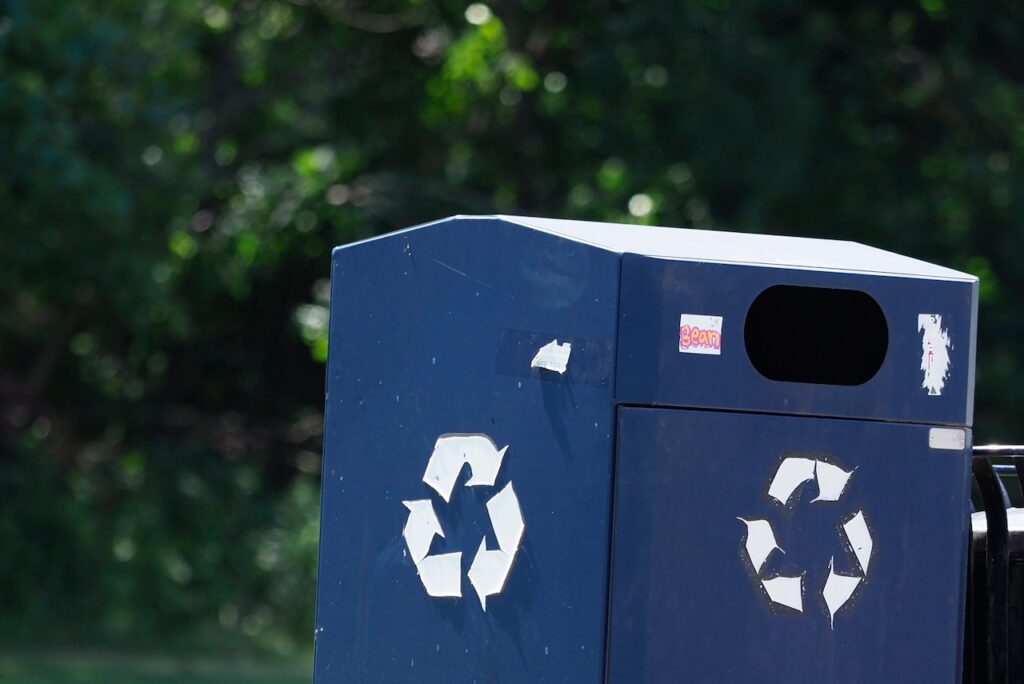Nearly three years into New Jersey’s plastic bag ban, residents continue to collect reusable bags, throw them out or donate them.
A pilot program aimed at collecting extra reusable bags — helping to provide a glimpse of just how much we’re amassing these — ended up with 65,080 of those bags from just three New Jersey towns and four counties, according to environmentalists and officials.
Most of those bags, 90%, were redistributed after proper cleaning, the Plastics Advisory Council said.
The council is made up of New Jersey business, environmental, academic and agency stakeholders. It was put in charge of monitoring the effectiveness of the strict plastic bag ban which began in May 2022.
The ban brought with it positive health impacts, organizers wrote in a new report. But the accumulation of reusable bags continues to be a ramification the state didn’t quite expect.
“A reusable bag collection program is underway to address an unintended consequence of the law where bags are being accumulated by residents using at home food delivery services. A pilot project launched by the New Jersey Food Council is now active in four New Jersey counties, with additional counties coming on board,” members of the Plastics Advisory Council wrote in the report about how Year 2 of the ban went.
The single-use plastic bill, which stemmed from the “Get Past Plastic Law,” barred grocery stores and most other kinds of stores in New Jersey from handing out single-use bags, be it paper or plastic, at the counter.
Cue reusable bags.
The bags became a problem because most major grocery stores and apps like Instacart and DoorDash — which host businesses like Wegmans, Kings, Aldi, Key Foods, and Save A Lot — offered to package online orders in a fresh set of bags for each purchase. A universal system to collect and wash those bags was not created.
They also piled up because customers bought reusable bags while checking out and simply forgot to bring them back during future store runs.
The Plastics Advisory Council spoke emphatically of the benefits the single-use plastic bag ban had on the state’s environment.
The group wants to build on those efforts. For one, they said, because it will help reduce microplastics — especially amid the ever-growing negative health effects scientists continue to link to that waste. While recent years have seen notable changes, statewide beach clean-ups continue to flag plastic as a common issue.
Authors of the new plastic waste report, echoing the first-year report, said after the plastic reduction law roughly 16.5 billion single-use plastic bags and 110 million single-use paper bags were kept out of the waste stream solely in the supermarket sector.
Exactly what impact the ban has had on the state’s recycling centers — such as if more reusable bags have entered the waste stream — is somewhat unclear due to the lack of specific study. But — again similar to the 2023 report — stakeholders and officials reccommended a number of new avenues to learn more.
Regarding the reusable bag dilemma, one lawmaker once proposed bringing back paper bags in some capacity and finding ways to sanitize reusables to return to customers.
The Plastics Advisory Council said in December that, in addition to a QR code made available to inform people on locations to bring reusable bags, there were a number of drop-off locations in place or set to be expanded upon. That included collection programs in Atlantic and Hudson counties, ten drop-off locations in Mercer County and two sponsored locations in Morris County.
In addition to two drop-offs in Union County (at the Elizabeth welfare agency and Westfield recycling center), that region expects to gain up to 14 more, organizers said.
Other New Jersey towns are steadily collecting reusables as well, including Woodbridge, Monroe Township, Secaucus and the food bank in Sparta.
State officials said sustainable reusable shopping bag supplier, GOATOTE, primarily collected the thousands of bags cited in the pilot program.
“They have reported that 90% of collected bags were qualified to be redistributed for use after sanitation,” The Plastics Advisory Council said. “Ten percent were determined to be unusable.”
Although some residents have donated reusable bags to food pantries, others have pointed to the fees placed on these bags — hoping the state determines a way to refund shoppers.
New Jersey lawmakers are mulling other ways to cut down on plastic too.
Steps like reducing plastic packaging materials and creating a bottle return system are being considered now in Trenton.
The Plastics Advisory Council also suggested the state get better about labeling goods made of materials that are harmful to the planet and outline a uniform way for the state’s 21 counties to communicate what qualifies as curbside recycling.
“From the macro scale as seen in mounds of trash in landfills, along roadways, and in waterways and the ocean, to nano scale where plastic is now found in brain tissue and transferred to the unborn, there is not a nook or cranny on Earth that has not been impacted by plastics,” Cindy Zipf, executive director of nonprofit Clean Ocean Action and Gary Sondermeyer, vice president of operations Bayshore Recycling, wrote in a Dec. 13, 2024 letter to state environmental regulators and fellow residents about the need for more action.
“The continuing dangers of plastic pollution demands a global call to action,” they said.
To read the full report click here: dep.nj.gov/wp-content/uploads/get-past-plastic/docs/pac-second-year-report.pdf. To find out where you can donate reusable bags visit litterfreenj.com.
Our journalism needs your support. Please subscribe today to NJ.com.
Steven Rodas may be reached at srodas@njadvancemedia.com. Follow him on Bluesky at @stevenrodas.bsky.social.

